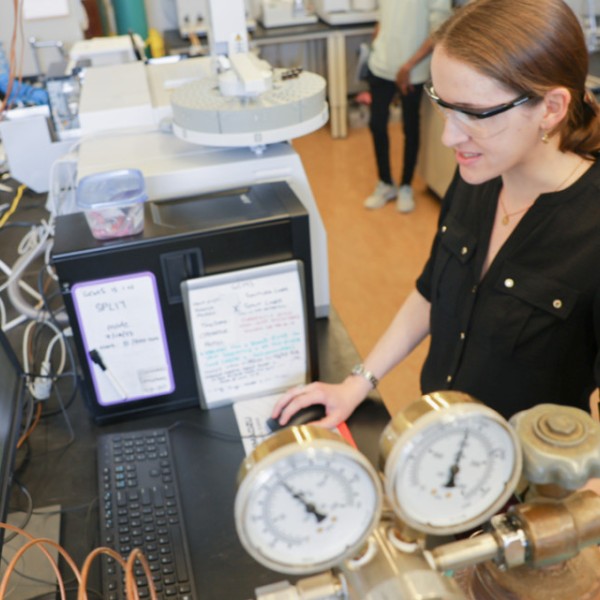Joe Regenstein
Professor Emeritus, Food Science
Joe M. Regenstein is a Professor in the Department of Food Science. He received a B.A. in chemistry from Cornell`s College of Arts and Sciences, an MS in dairy chemistry from CALS, and a PhD in biophysics from Brandeis University in Waltham, MA. He joined the faculty in 1974 and is a member of the Field of Food Science and the Field of International Development. He is an Adjunct Professor in Population Medicine and Diagnostic Sciences in the Vet School, a member of the Governing Board of the Science of Natural and Environmental Systems (SNES) program, and a member of the Program of Jewish Studies. He is also an Adjunct Professor in the Food Industry Program at Kansas State University.
Research Focus
Use of by-products, particularly from fish processing wastes.
After many years of working with minced fish (fish hamburger), we have been studying the process of obtaining fish gelatin with the goal of increasing yield to fulfill market demand. Fish skins and scales are by-products of the fish-processing industry and can be successfully processed into gelatin. They offer a wider range of melting temperatures, which provides product development possibilities, and unique value-added marketing opportunities to the kosher and halal markets and to those who may want to avoid gelatins from warm blooded animals.
Increase in small scale animal agriculture.
Sheep and goats are becoming more important to the farm base. The major markets for sheep and goats are ethnic and religious markets, e.g., the kosher and halal markets. The issue of lung health constitutes a major obstacle to kosher market expansion in New York State, and must be resolved to open up new markets to benefit farmers, consumers, ethnic/religious minorities, and other consumer groups. We will use ultrasound on live animals to determine lung health followed by post-slaughter inspection of these lungs, seeking to improve animal lung health and, eventually, to be able to screen out animals that will not pass the kosher lung inspection.
Outreach and Extension Focus
My primary outreach program is the Cornell Kosher and Halal Food Initiative, (CKHFI) a unique program that provides significant impact to its stakeholders. The goal of CKHFI is to help the food industry be successful in providing kosher and halal foods to consumers worldwide. There are several key stakeholders. (1) Consumers purchase $1.5 billion worth of kosher food in the United States each year. These customers include those observing dietary laws for religious reasons and others who benefit from this system, e.g., people with allergies. (2) The food industry constantly needs to determine its role in the process and evaluate the opportunities that exist in this market. In practical terms, much of the outreach is extended to this group, sometimes as individual companies and sometimes through associations such as the AMI (American Meat Institute). (3) The religious supervision agencies need to understand developments in the food industry. This work is made more complex because of the variety of supervision agencies. (4) Various governmental and regulatory agencies have an interest in these processes’ working smoothly to ensure that consumers are well served. (5) When issues rise to the level of news, the press becomes involved and is looking for appropriate, impartial input.
Teaching Focus
The teaching focus has been directed towards the following goals for students: 1) to think critically about scientific facts and how they must be examined and understood as part of a larger view of the world, even when the facts seem counter-intuitive to students’ experience or expectation; 2) to be able to incorporate knowledge and understanding of diversity as it affects consumer food choices; this requires understanding how a manufacturer might respond to resulting consumer choices based on religious law; and 3) to be able to incorporate knowledge and understanding of animal welfare and environmental sustainability as critical to the long term health of the food supply.
Areas of Expertise
- animal welfare
- chef’s chemistry
- dietary laws
- diversity
- environmental stewardship
- ethnic foods
- fish
- fish bone
- fish gelatin
- fish scales
- fish skins
- goats
- halal
- kosher
- lung adhesions
- lungs
- sheep
- snes capstone
- ultrasound
Graduate Fields
- Food Science and Technology
- International Development
Education
- Doctorate
Brandeis University - 1972 - Master of Science
Cornell University - 1966 - Bachelor of Science
Cornell University - 1965
Awards & Honors
- Albert Flegenheimer Memorial Graduate Fellowship Fund Endowment Albert Flegenheimer Memorial Graduate Fellowship
- State Team Award for the Hydroponics Learning Model Project led by Philson A.A Warner Epsilon Sigma Phi
- Guest Professor 2018 Southwest University in Chongqing, China
- Member of the Academic Committee of the International Joint Laboratory on Food Safety 2017 Jiangnan University
- Distinguished Foreign Expert and Visiting Professor at Jiangnan University, Wuxi, China 2014
- DeTao Master 2013 DeTao Master's Academy
- Shelf Life Advisor Blog Editorial Board 2012 Shelf Life Advisor Blog
- Bor S. Luh International Award (2015) IFT
- Outstanding Accomplishments in Science and Public Policy (2014) CALS
- Aquatic Products 2012-2013 Service Award (2013) IFT
Courses Taught
- FDSC 6960: Graduate Internship in Food Science
- ANSC 3100: Introduction to Animal Welfare
- FDSC 2500: Kosher and Halal Food Regulations
- JWST 2501: Kosher and Halal Food Regulations
- FDSC 5000: Master of Professional Studies (Agriculture) Project
Joe in the news

News
An interdisciplinary team of researchers determined that organic residues of plant oils are poorly preserved in calcareous soils from the Mediterranean, leading decades of archaeologists to likely misidentify olive oil in ceramic artifacts.
- School of Integrative Plant Science
- Soil

News
Eating flours, burgers and fitness bars made from crickets, mealworms or black soldier fly larvae could help feed a growing global population sustainably, but it might hit resistance from those who follow halal or kosher regulations.
- Food Science
- Health + Nutrition
- Environment

